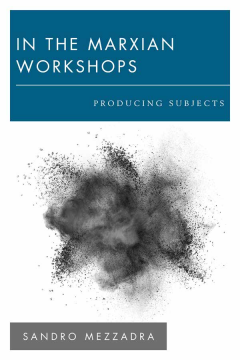
Additional Information
Book Details
Abstract
Theorists have often returned to the work of Marx, to interpret and better understand global developments and current political and economic crisis. In the Marxian Workshops: Producing Subjects combines an attempt to develop a specific reading of Marx with a set of interventions on high stakes topics in contemporary critical debates. Sandro Mezzadra offers a close reading of Marx on the ‘production of subjectivity’ as a crucial test for assessment of some of the most important Marxian concepts and of their potential for grasping the present, from the point of view of radical transformation.
It is not an exaggeration to say that it is an intellectual event to have Sandro Mezzadra's theoretical work on Marx published in English. No one brings together the global struggles for liberation into a theoretical framework of contemporary capitalism more deftly than Mezzadra. Under his guidance we come to see that the battle against capitalism has now been joined by most of the planet expanding rather than erasing the old antagonism, and proliferating in the creative forms of life that refuse to submit.
Stefano Harney, Professor of Strategic Management Education, Singapore Management University
Politics is being produced in the Marxian workshops. Sandro Mezzadra turns the discussion on Marx from the usual scholarly mode of textual certitudes to a provisional, tension-filled, dialectical exercise, which has the capacity to suggest new angles, possibilities, and new problems of articulating transformative politics. Such politics is never given. It is produced. Political ideas can only be workshops for such production. That perhaps is the way by which Marx can be drawn out of the sedate and satisfied chambers of western academic thinking to the violent storms blowing in the broader world.
Ranabir Samaddar, Director of the Calcutta Research Group
In this book, we find a displaced Marx: at his own kitchen table. Displacement became a method: Marx beyond Marxism, to be found today in a new world which he however foresaw. Marx’s kitchen table which this beautiful text enables us to enter, is where proletarian bodies are in the making and the possibility of their becoming a revolutionary movement is ever present.
Verónica Gago, Professor of Social Sciences, University of Buenos Aires
Sandro Mezzadra is Associate Professor of Political Theory at the University of Bologna.
New figures of labor and new machines for the extraction of surplus values: Sandro Mezzadra’s Marxian research is located between these two poles. This is an open work, open in a double sense. Firstly from a genealogical point of view, since it sums up and further develops the best accomplishments of Marx studies in the last fifty years from the angle of a critical analysis of the formation of the proletariat into a class. In the Marxian Workshops is an open work, secondly, because it invites its readers to participate in the solution of this latter riddle: this is what production of subjectivity means here, the revolutionary subjectivation that Marx continues to claim from anybody interested in his work.
Antonio Negri, Co-Author of Empire
Table of Contents
| Section Title | Page | Action | Price |
|---|---|---|---|
| Cover | Cover | ||
| In the MarxianWorkshops | i | ||
| In the Marxian Workshops: Producing Subjects | iii | ||
| Copyright Page | iv | ||
| Contents | v | ||
| Abbreviations to Marx’s Works | vii | ||
| Introduction to the English Edition | ix | ||
| Preface | xvii | ||
| Chapter 1 | 1 | ||
| Marx Beyond Marxism | 1 | ||
| Notes | 7 | ||
| Chapter 2 | 9 | ||
| Production of Subjectivity | 9 | ||
| Notes | 15 | ||
| Chapter 3 | 17 | ||
| A Twofold Beginning | 17 | ||
| Notes | 25 | ||
| Chapter 4 | 27 | ||
| The Subject of History, \nthe Subject in History | 27 | ||
| Notes | 33 | ||
| Chapter 5 | 35 | ||
| Living Labour | 35 | ||
| Notes | 43 | ||
| Chapter 6 | 45 | ||
| Hobbesian Spectres | 45 | ||
| Notes | 54 | ||
| Chapter 7 | 57 | ||
| Labour Power | 57 | ||
| Notes | 65 | ||
| Chapter 8 | 67 | ||
| Class (Struggle) | 67 | ||
| Notes | 74 | ||
| Chapter 9 | 75 | ||
| ‘The Political Form at Last Discovered’ | 75 | ||
| Notes | 83 | ||
| Chapter 10 | 85 | ||
| Marx in Algiers | 85 | ||
| Notes | 92 | ||
| Note | 100 | ||
| Appendix | 101 | ||
| The Topicality of Prehistory: A New Reading of Marx’s Analysis of ‘So-called Primitive Accumulation’ | 101 | ||
| Primitive Accumulation Today | 101 | ||
| Questions of Method | 103 | ||
| For a Critique of Classical (and ‘Vulgar’) Economics | 105 | ||
| A Commodity Like No Other | 108 | ||
| ‘Free’ Labour? | 110 | ||
| In Transition | 112 | ||
| In Search of the Common: Of Communism | 117 | ||
| Notes | 118 | ||
| Bibliography | 121 | ||
| Index | 133 | ||
| About the Author | 143 |
